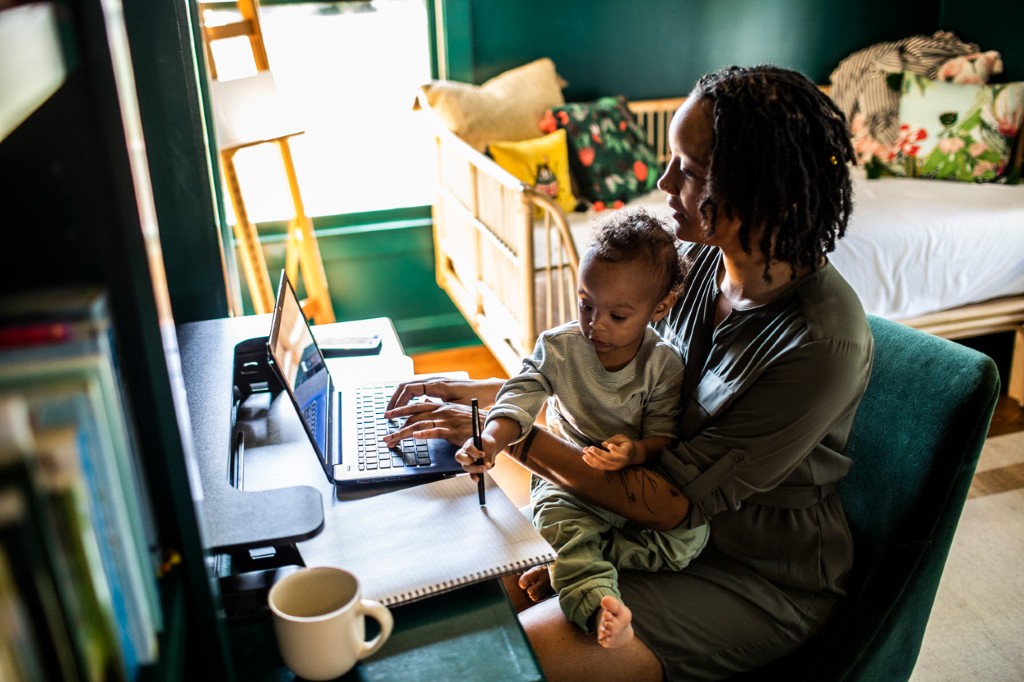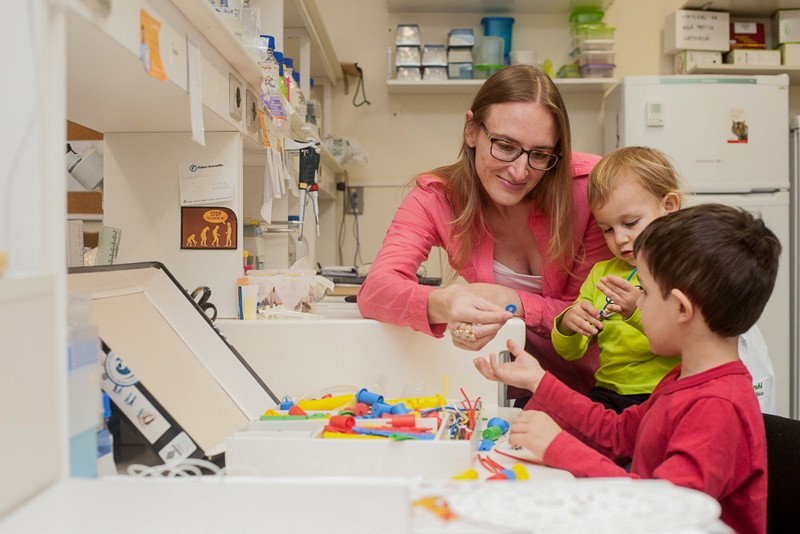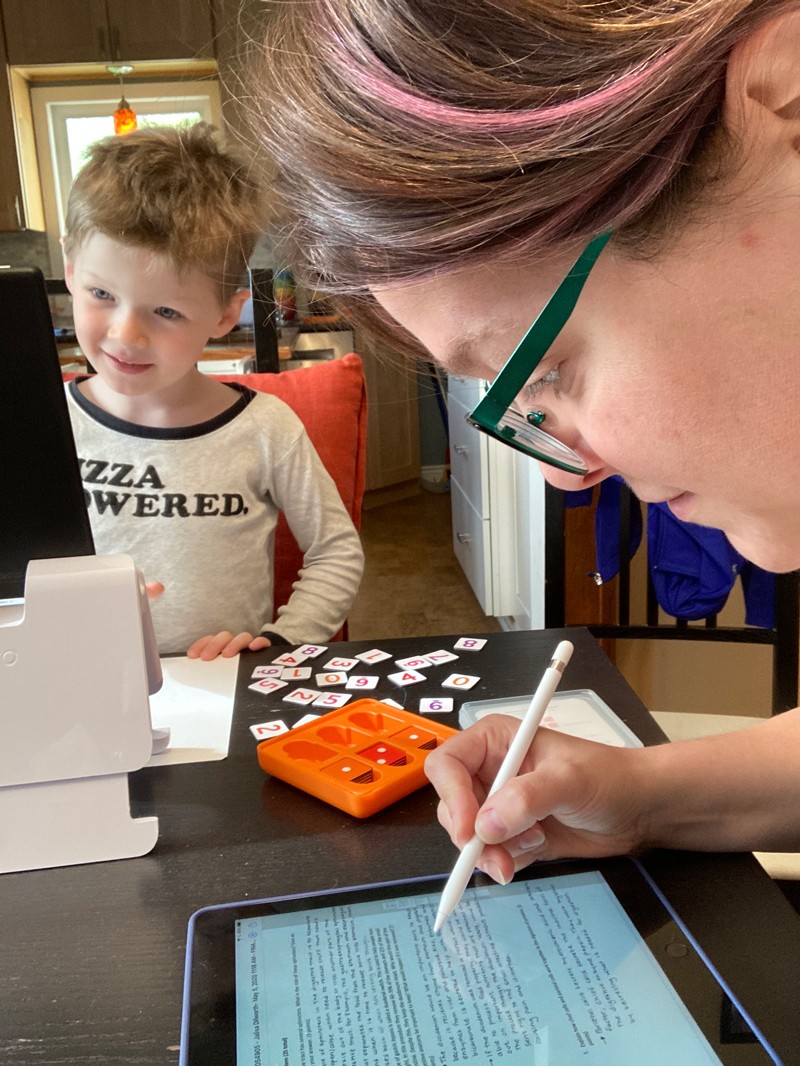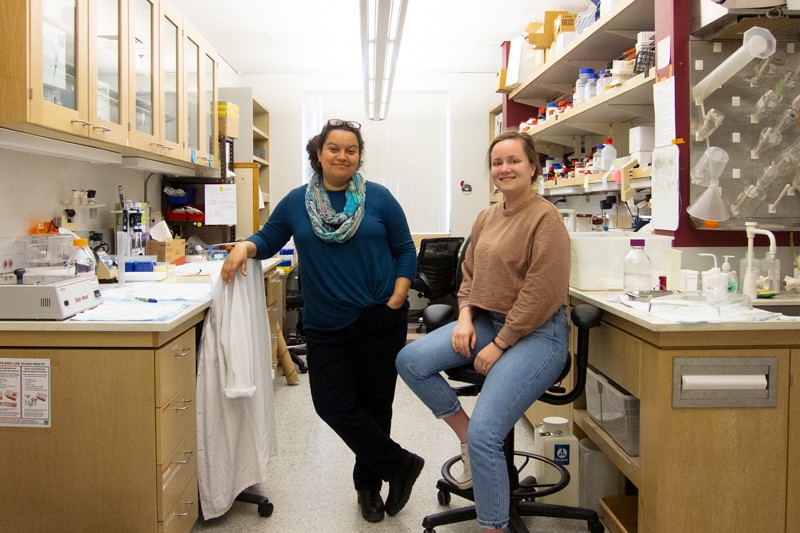[ad_1]
As Ava, a postdoctoral researcher at a top-tier university in North Carolina, bounces her three-month-old daughter on her lap during the final days of her family leave, she worries about whether she will be able to realize her dream of becoming a principal investigator (PI). Her biggest roadblock is the lack of affordable childcare. “You have to be competitive in order to get the PI positions, and I won’t be able to do that if I’m not able to put her in day care,” she says.
Ava’s only realistic option will cost roughly US$1,700 a month — 49% of her monthly salary — for day care and fuel for her two- to three-hour commute to and from their home in an affordable neighborhood. Using a large slice of household income for day care — while missing out on many childhood milestones — doesn’t make financial or emotional sense. It’s a dilemma that many working mothers face: why bother working if they are just working to pay for childcare? To finish her postdoc, Ava worked out the following schedule with her PI: she will arrive at work by 5 a.m. to generate data, then leave at around 2 p.m. to spend quality time with her daughter, and she will analyse the data during evenings and weekends. “My whole goal is to be the best mom I can be, and if that means I have to put my career dream on the backburner, I may have to bite that bullet,” she says.
Spurred by similar stories from scientist parents in the United States, where there is no national policy for paid family leave, Frankie Heyward, a postdoc studying neuro-epigenetics at Beth Israel Deaconess Medical Center in Boston, Massachusetts, wanted to help. As founder and current president of the National Black Postdoctoral Association (NBPA), Heyward started a crowdfunding initiative in February to help offset childcare costs for Black early-career scholars such as Ava. These scientist parents are so close to finishing their training, says Heyward. “They just need resources for childcare.” The NBPA Childcare Fund has so far raised more than US$5,500.In the past few years, several childcare crowdfunding campaigns have emerged in the United States and Brazil. Some of these initiatives are dedicated solely to mothers of colour, and others prioritize them. Nature highlights four such efforts here, but is keen to hear about others.
These grass-roots initiatives aim to help retain mothers in academia — loss of whom threatens to erase slim diversity gains in academic science. Ava, who is 33 and requested that we don’t use her real name to protect her privacy, is the average age at which male and female academics in the United States and Canada become parents1. However, many mothers’ careers are derailed. “We are losing women, and it is very frustrating to watch really good colleagues leave academia,” says Mariya Sweetwyne, a renal-cell biologist at the University of Washington School of Medicine in Seattle and a founder of a crowdfunding campaign. “I’m so grateful of all the people who donated, but it’s outrageous that we need to solicit private donations to offer a lifeline to a minoritized mother’s career,” she says. “If institutions are serious about their stated commitment to equity and diversifying academic medicine and research, then this lack of parenting support has to be addressed immediately.”
Only about half of public US universities that grant bachelor’s degrees offer on-site childcare — and even fewer private institutions do, according to 2021 analyses2 conducted by Child Trends, a non-profit children’s research organization in Bethesda, Maryland. Where they exist, university day-care centres are often expensive and have waiting lists of months to years. Yet, women report that paid parental leave and adequate childcare are crucial factors in applying for and staying in jobs.
Pandemic crowdfunding
The COVID-19 pandemic amplified existing barriers to women’s careers. Many mothers assumed greater childcare responsibilities — and support became less reliable3. The lack of affordable childcare is an unrelenting concern amid efforts to improve diversity, equity and inclusivity on university campuses. “These crowdfunds highlight that women, particularly women of colour, are not getting the support that they need to survive, let alone thrive,” in science, technology, engineering and maths, says Michelle Cardel, a health-outcomes researcher at the University of Florida in Gainesville, who studies gender disparities in academia.
Last year, Sweetwyne organized an effort to help researcher mothers from under-represented groups through Academic Research Moms (ARM), a private Facebook group of roughly 3,100 women. Through the GoFundMe platform, ARM has so far raised more than $90,000 specifically to offset childcare costs for medical and research trainees of colour. Following the 2020 death of George Floyd, a Black man who was murdered by a white police officer in Minneapolis, Minnesota, the group’s conversations focused on the sluggish pace of increasing diversity in higher education. Sweetwyne thought a diversity-focused fund could at least serve to patch one hole in the leaky pipeline. Donors agreed — they raised $60,000 in the first two months.
In many instances, the donations come from other academic mums, a group hit hard by pandemic strain. The irony is not lost on Sweetwyne that individual mothers are trying to help academic institutions fix their pipeline issues. “We’re not doing it for [the institutions]. We’re doing it for us,” she says of the almost 1,000 donors to the fund. Institutions, she adds, should do much more to address ongoing childcare concerns.
After exploring options to dispense donations, Sweetwyne found an enthusiastic partner in Meharry Medical College, a historically Black medical school in Nashville, Tennessee, with a strong need. There is no childcare on campus, and the average debt of students at Meharry is more than $300,000, according to director of estate planning and giving Gloria Sanders. “Childcare continues to be a major need for employees and students,” she says. ARM funding has provided one-time awards of roughly $1,250–1,500 to more than 30 women since 2020.
During the final year of her cancer-biology PhD studies at Meharry, Heather Beasley received an ARM award of $1,500 — just shy of her monthly salary. “It was life-changing for me,” she says, explaining that rent plus the cost of her daughter’s childcare ate up most of her monthly income. “For one month, it offset major costs that I didn’t have to put on a credit card.”
Beasley estimates that she kept her daughter in childcare for 40% of her time in graduate school, in part because it was too expensive. The rest of the time, she worked nights and weekends, when her husband could look after their child. Once she finishes her current postdoctoral position at Vanderbilt University in Nashville, she intends to pursue higher-paying employment in industry. “I can influence my community without being subjected to low wages,” she says.
Female scientists are among the most difficult groups to retain in academia. Black and Hispanic women comprise just 5% or less of tenured faculty in the United States, according to a study4 that Cardel published in 2020. And the pandemic exacerbated the challenges. “When childcare was unavailable or limited, we saw a secondary epidemic of women leaving the workforce,” says Cardel. When it comes to institutional diversity, equity and inclusivity aims, Sweetwyne says, “it seems the goal is to increase the flow; it doesn’t seem like the goal is to reduce the leak”.
To try to curb that leak, Cindy Harley, a biologist at Metropolitan State University in Saint Paul, Minnesota, founded the Academic Mamas Foundation in 2018, and serves as the president of the non-profit organization. The foundation has raised roughly $12,000 to help support mothers, and has formed a partnership with the International Association of Maternal Action and Scholarship, an advocacy group. They distribute mainly informal small grants — $250–500 at a time — to help people who have, for example, taken leave to care for children. Larger grants have funded childcare for conference attendees. But this ‘moms helping moms’ approach has been stymied by pandemic fatigue, says Harley.
Brazil’s crowdfunding success
In Brazil, the Parent in Science Movement gathered donations early in the pandemic for a similar crowdfunded effort, called the Tomorrow Program. The effort raised 100,000 Brazilian reais (US$20,000) to offer doctoral-student mothers from minority ethnic groups childcare stipends of roughly 700 reais (US$150) a month. They had 750 applicants for 26 slots.
Last year, the movement won a US$40,000 Nature Research Award for Inspiring Women in Science. It plans to use around 20% of the prize money — plus crowdfunding that it hopes will triple that amount — to fund the Tomorrow Program for a second year. “While we realize crowdfunding is not a sustainable solution, it is the only alternative” because no private sponsors stepped up, says movement founder Fernanda Staniscuaski, a molecular biologist at the Federal University of Rio Grande do Sol in Porto Alegre, Brazil. This year, the fund will focus on undergraduate mothers and is accepting applications during the last two weeks of May.
Despite significant cuts to Brazil’s federal scientific agencies in recent years, some universities have created structural support. The State University of Rio de Janeiro, Brazil, pays 900 Brazilian reais monthly to student parents. “There is a big demand for this kind of action. It would be really nice if we had federal government support,” says Staniscuaski.
Although crowdfunding childcare is a stop-gap attempt to staunch the flow of scientist mothers, especially those from under-represented groups, from leaving academia, long-term measures are needed. A 2022 perspective piece5 published in Academic Medicine called for childcare stipends as part of US National Institutes of Health grants to address persistent racial and gender disparities in physician-scientists. “Grants should provide childcare stipends to PIs and trainees alike to ease the financial burden and show moms that they are valued in academia,” says study co-author Heather Ward, a psychiatrist and research fellow at Beth Israel Deaconess Medical Center.
One tenured scientist mother turned to grants to create lasting change. Lesley Lutes, director of clinical training for the doctoral programme in clinical psychology at the University of British Columbia’s Okanagan Campus in Kelowna, Canada, channelled her own frustrations, including a three-year waiting list for childcare, into action. She partnered with the university to write two successful grant applications, totalling $2.2 million, to triple the size of the existing non-profit childcare centre on campus to around 100 spots. Before the expansion, some women took extended leave, considered leaving academia or found more affordable childcare in nearby cities, she explains. “There wasn’t more action before because women weren’t at the table,” says Lutes.
Some institutions are making affordable childcare a cornerstone of their recruitment and retention efforts. In 2019, a taskforce at Vanderbilt University outlined how to expand childcare access on campus. Their on-campus childcare facility aims to keep costs 20% below market rate in Nashville and offers discounts on the basis of income level. Still, children of graduate students hold only 9% of day-care slots.
“Our biggest hurdle has been recruiting and keeping childcare staff,” says Patrick Retton, associate vice-chancellor for administration and chief of operations at Vanderbilt. To bolster that staff, the facility director secured two federal grants to provide salary bonuses. “Vanderbilt is focused on employee recruitment and retention, and one of the subtopics is the rewards and benefits, including childcare, to the university as a whole,” says Retton.
Vanderbilt’s efforts to provide affordable, accessible childcare to retain academic parents is an obvious yet rare example. “[Academic mothers] are getting to the final phase of training and having to abandon their dreams because of the financial hurdles,” says Heyward. “I want to show with my fund that when you provide support to individuals, they can stay the course,” he adds, “and I want institutions to appreciate that.”
Sweetwyne agrees: “We can’t GoFundMe forever, but we do intend to keep hammering at this until — institutions willing — it’s unnecessary.”
[ad_2]
As Ava, a postdoctoral researcher at a top-tier university in North Carolina, bounces her three-month-old daughter on her lap during the final days of her family leave, she worries about whether she will be able to realize her dream of becoming a principal investigator (PI). Her biggest roadblock is the lack of affordable childcare. “You have to be competitive in order to get the PI positions, and I won’t be able to do that if I’m not able to put her in day care,” she says.
Ava’s only realistic option will cost roughly US$1,700 a month — 49% of her monthly salary — for day care and fuel for her two- to three-hour commute to and from their home in an affordable neighborhood. Using a large slice of household income for day care — while missing out on many childhood milestones — doesn’t make financial or emotional sense. It’s a dilemma that many working mothers face: why bother working if they are just working to pay for childcare? To finish her postdoc, Ava worked out the following schedule with her PI: she will arrive at work by 5 a.m. to generate data, then leave at around 2 p.m. to spend quality time with her daughter, and she will analyse the data during evenings and weekends. “My whole goal is to be the best mom I can be, and if that means I have to put my career dream on the backburner, I may have to bite that bullet,” she says.
Spurred by similar stories from scientist parents in the United States, where there is no national policy for paid family leave, Frankie Heyward, a postdoc studying neuro-epigenetics at Beth Israel Deaconess Medical Center in Boston, Massachusetts, wanted to help. As founder and current president of the National Black Postdoctoral Association (NBPA), Heyward started a crowdfunding initiative in February to help offset childcare costs for Black early-career scholars such as Ava. These scientist parents are so close to finishing their training, says Heyward. “They just need resources for childcare.” The NBPA Childcare Fund has so far raised more than US$5,500.In the past few years, several childcare crowdfunding campaigns have emerged in the United States and Brazil. Some of these initiatives are dedicated solely to mothers of colour, and others prioritize them. Nature highlights four such efforts here, but is keen to hear about others.
These grass-roots initiatives aim to help retain mothers in academia — loss of whom threatens to erase slim diversity gains in academic science. Ava, who is 33 and requested that we don’t use her real name to protect her privacy, is the average age at which male and female academics in the United States and Canada become parents1. However, many mothers’ careers are derailed. “We are losing women, and it is very frustrating to watch really good colleagues leave academia,” says Mariya Sweetwyne, a renal-cell biologist at the University of Washington School of Medicine in Seattle and a founder of a crowdfunding campaign. “I’m so grateful of all the people who donated, but it’s outrageous that we need to solicit private donations to offer a lifeline to a minoritized mother’s career,” she says. “If institutions are serious about their stated commitment to equity and diversifying academic medicine and research, then this lack of parenting support has to be addressed immediately.”
Only about half of public US universities that grant bachelor’s degrees offer on-site childcare — and even fewer private institutions do, according to 2021 analyses2 conducted by Child Trends, a non-profit children’s research organization in Bethesda, Maryland. Where they exist, university day-care centres are often expensive and have waiting lists of months to years. Yet, women report that paid parental leave and adequate childcare are crucial factors in applying for and staying in jobs.
Pandemic crowdfunding
The COVID-19 pandemic amplified existing barriers to women’s careers. Many mothers assumed greater childcare responsibilities — and support became less reliable3. The lack of affordable childcare is an unrelenting concern amid efforts to improve diversity, equity and inclusivity on university campuses. “These crowdfunds highlight that women, particularly women of colour, are not getting the support that they need to survive, let alone thrive,” in science, technology, engineering and maths, says Michelle Cardel, a health-outcomes researcher at the University of Florida in Gainesville, who studies gender disparities in academia.
Last year, Sweetwyne organized an effort to help researcher mothers from under-represented groups through Academic Research Moms (ARM), a private Facebook group of roughly 3,100 women. Through the GoFundMe platform, ARM has so far raised more than $90,000 specifically to offset childcare costs for medical and research trainees of colour. Following the 2020 death of George Floyd, a Black man who was murdered by a white police officer in Minneapolis, Minnesota, the group’s conversations focused on the sluggish pace of increasing diversity in higher education. Sweetwyne thought a diversity-focused fund could at least serve to patch one hole in the leaky pipeline. Donors agreed — they raised $60,000 in the first two months.
In many instances, the donations come from other academic mums, a group hit hard by pandemic strain. The irony is not lost on Sweetwyne that individual mothers are trying to help academic institutions fix their pipeline issues. “We’re not doing it for [the institutions]. We’re doing it for us,” she says of the almost 1,000 donors to the fund. Institutions, she adds, should do much more to address ongoing childcare concerns.
After exploring options to dispense donations, Sweetwyne found an enthusiastic partner in Meharry Medical College, a historically Black medical school in Nashville, Tennessee, with a strong need. There is no childcare on campus, and the average debt of students at Meharry is more than $300,000, according to director of estate planning and giving Gloria Sanders. “Childcare continues to be a major need for employees and students,” she says. ARM funding has provided one-time awards of roughly $1,250–1,500 to more than 30 women since 2020.
During the final year of her cancer-biology PhD studies at Meharry, Heather Beasley received an ARM award of $1,500 — just shy of her monthly salary. “It was life-changing for me,” she says, explaining that rent plus the cost of her daughter’s childcare ate up most of her monthly income. “For one month, it offset major costs that I didn’t have to put on a credit card.”
Beasley estimates that she kept her daughter in childcare for 40% of her time in graduate school, in part because it was too expensive. The rest of the time, she worked nights and weekends, when her husband could look after their child. Once she finishes her current postdoctoral position at Vanderbilt University in Nashville, she intends to pursue higher-paying employment in industry. “I can influence my community without being subjected to low wages,” she says.
Female scientists are among the most difficult groups to retain in academia. Black and Hispanic women comprise just 5% or less of tenured faculty in the United States, according to a study4 that Cardel published in 2020. And the pandemic exacerbated the challenges. “When childcare was unavailable or limited, we saw a secondary epidemic of women leaving the workforce,” says Cardel. When it comes to institutional diversity, equity and inclusivity aims, Sweetwyne says, “it seems the goal is to increase the flow; it doesn’t seem like the goal is to reduce the leak”.
To try to curb that leak, Cindy Harley, a biologist at Metropolitan State University in Saint Paul, Minnesota, founded the Academic Mamas Foundation in 2018, and serves as the president of the non-profit organization. The foundation has raised roughly $12,000 to help support mothers, and has formed a partnership with the International Association of Maternal Action and Scholarship, an advocacy group. They distribute mainly informal small grants — $250–500 at a time — to help people who have, for example, taken leave to care for children. Larger grants have funded childcare for conference attendees. But this ‘moms helping moms’ approach has been stymied by pandemic fatigue, says Harley.
Brazil’s crowdfunding success
In Brazil, the Parent in Science Movement gathered donations early in the pandemic for a similar crowdfunded effort, called the Tomorrow Program. The effort raised 100,000 Brazilian reais (US$20,000) to offer doctoral-student mothers from minority ethnic groups childcare stipends of roughly 700 reais (US$150) a month. They had 750 applicants for 26 slots.
Last year, the movement won a US$40,000 Nature Research Award for Inspiring Women in Science. It plans to use around 20% of the prize money — plus crowdfunding that it hopes will triple that amount — to fund the Tomorrow Program for a second year. “While we realize crowdfunding is not a sustainable solution, it is the only alternative” because no private sponsors stepped up, says movement founder Fernanda Staniscuaski, a molecular biologist at the Federal University of Rio Grande do Sol in Porto Alegre, Brazil. This year, the fund will focus on undergraduate mothers and is accepting applications during the last two weeks of May.
Despite significant cuts to Brazil’s federal scientific agencies in recent years, some universities have created structural support. The State University of Rio de Janeiro, Brazil, pays 900 Brazilian reais monthly to student parents. “There is a big demand for this kind of action. It would be really nice if we had federal government support,” says Staniscuaski.
Although crowdfunding childcare is a stop-gap attempt to staunch the flow of scientist mothers, especially those from under-represented groups, from leaving academia, long-term measures are needed. A 2022 perspective piece5 published in Academic Medicine called for childcare stipends as part of US National Institutes of Health grants to address persistent racial and gender disparities in physician-scientists. “Grants should provide childcare stipends to PIs and trainees alike to ease the financial burden and show moms that they are valued in academia,” says study co-author Heather Ward, a psychiatrist and research fellow at Beth Israel Deaconess Medical Center.
One tenured scientist mother turned to grants to create lasting change. Lesley Lutes, director of clinical training for the doctoral programme in clinical psychology at the University of British Columbia’s Okanagan Campus in Kelowna, Canada, channelled her own frustrations, including a three-year waiting list for childcare, into action. She partnered with the university to write two successful grant applications, totalling $2.2 million, to triple the size of the existing non-profit childcare centre on campus to around 100 spots. Before the expansion, some women took extended leave, considered leaving academia or found more affordable childcare in nearby cities, she explains. “There wasn’t more action before because women weren’t at the table,” says Lutes.
Some institutions are making affordable childcare a cornerstone of their recruitment and retention efforts. In 2019, a taskforce at Vanderbilt University outlined how to expand childcare access on campus. Their on-campus childcare facility aims to keep costs 20% below market rate in Nashville and offers discounts on the basis of income level. Still, children of graduate students hold only 9% of day-care slots.
“Our biggest hurdle has been recruiting and keeping childcare staff,” says Patrick Retton, associate vice-chancellor for administration and chief of operations at Vanderbilt. To bolster that staff, the facility director secured two federal grants to provide salary bonuses. “Vanderbilt is focused on employee recruitment and retention, and one of the subtopics is the rewards and benefits, including childcare, to the university as a whole,” says Retton.
Vanderbilt’s efforts to provide affordable, accessible childcare to retain academic parents is an obvious yet rare example. “[Academic mothers] are getting to the final phase of training and having to abandon their dreams because of the financial hurdles,” says Heyward. “I want to show with my fund that when you provide support to individuals, they can stay the course,” he adds, “and I want institutions to appreciate that.”
Sweetwyne agrees: “We can’t GoFundMe forever, but we do intend to keep hammering at this until — institutions willing — it’s unnecessary.”








Leave a Reply